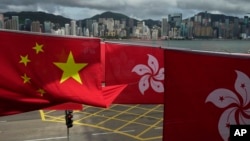WASHINGTON -
China's 100-Day 'Strike Hard' Campaign Targets Uyghurs in Xinjiang
Chinese authorities launched a 100-day "strike hard" campaign against Uyghurs in Xinjiang, cracking down on gatherings of more than 30 people, according to Chinese media.
The latest persecution of the predominantly Muslim Uyghurs who live in Xinjiang coincides with the sensitive anniversary of the 2009 ethnic violence in Urumqi, which triggered the Chinese government's efforts to repress Uyghur culture and religion with mass surveillance and internment campaigns. Uyghur rights groups see this as ongoing ethnic and cultural genocide. The U.S. government and Western parliaments have condemned the abuses, labeling them genocide or crimes against humanity. China denies any human rights abuses in the region.
Uyghur Teenage Girls Forced into Labor at Xinjiang Garment Factory
According to an investigation by Radio Free Asia, approximately 90 Uyghur teenage girls in Xinjiang are forcibly working in a Chinese-run garment factory. The girls, aged 16-18, work 14 hours a day, seven days a week, and routinely face both verbal and physical abuse. The factory, Wanhe Garment Co. Ltd., has a clandestine agreement with a nearby vocational high school that forces female students to work against their will, according to the investigation. Local authorities pressure parents not to protest their children's employment, and the workers are kept under control by an abusive supervisor, RFA reported. These findings add to the growing evidence of Uyghur forced labor in Xinjiang, prompting scrutiny of major companies like Zara and Uniqlo to ensure their supply chains are free from such practices.
Volkswagen Stands Firm on Xinjiang Plant Audit Amid Human Rights Concerns
Volkswagen reaffirmed its commitment to an independent audit of its Xinjiang plant amid concerns about human rights abuses against Uyghurs in the region. The company said in a statement that it remains convinced an independent auditor can “deliver important information about the human rights situation” at its Xinjiang plant. The statement came after some investors criticized the effectiveness of any audit in the tightly controlled region. Volkswagen emphasized its adherence to human rights principles but did not directly address censorship and anti-espionage law concerns in the region.
US Lawmakers Propose Tough Measures Against Forced Uyghur Labor Enablers
U.S. lawmakers have taken significant actions this week, proposing new bills and investigations to address Uyghur forced labor in Xinjiang. Senator Marco Rubio, a Florida Republican, reintroduced the "Sanctioning Supporters of Slave Labor Act" with the aim of expanding sanctions against entities suspected of violating Uyghur human rights, while Congressman Jim Banks, an Indiana Republican, introduced similar legislation in the House of Representatives. Additionally, Congresswoman Jennifer Wexler, a Virginia Democrat, plans to reintroduce the "Uyghur Forced Labor Disclosure Act," which would mandate supply chain audits for companies sourcing goods from Xinjiang.
Exiled Uyghur's Istanbul Bookshop Faces China's Pressure and Copyright Disputes
Abdullah Turkistanli, an exiled Uyghur, is the owner of the Kutadgu Bilig Bookshop in Istanbul, which he opened to preserve Uyghur literature that is banned in China. To do so, he prints most of the books himself using PDFs of the originals, as Chinese publishers are prohibited from granting permission for reprinting. Despite his noble mission, Beijing's pressure led Turkish police to raid his shop twice and seize thousands of books, accusing him of copyright infringement. As a survivor of Chinese prisons, Turkistanli is dedicated to protecting Uyghur culture, but these legal challenges have posed significant obstacles. Uyghur activists are now urging the Turkish government to consider the harsh reality faced by the Uyghurs and help in preserving their literature, rather than bowing to China's pressure.
News in brief
In a recent article by the China Communist Party (CCP) committee, senior CCP officials expressed their active involvement in diplomacy to counter "anti-China forces," especially the U.S., amid allegations of genocide and human rights abuses against Uyghurs and other minorities in Xinjiang. The officials aim to promote positive narratives about Xinjiang globally and to strengthen the rule of law in response to international criticism. However, human rights activists have raised concerns about potential repression of rights defenders. They urge governments to take decisive action to protect Uyghur rights and end forced labor in global supply chains. The U.S. has imposed sanctions on Chinese officials involved in alleged abuses, while China's Diplomatic Relations Law grants Beijing powers to counter actions it deems harmful to its interests.
Quote of note
“Further actions must be taken to hold accountable those individuals and entities benefiting from the forced labor of Uyghurs. Not only should China’s genocidal regime answer for the crimes they are committing but also the companies that profit from these atrocities.”




